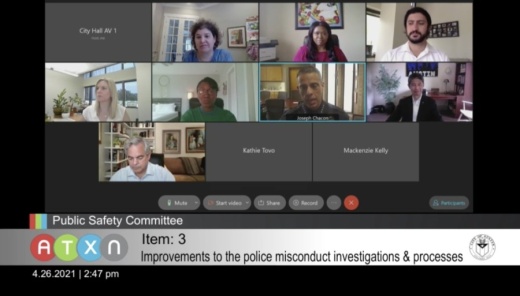Joseph Chacon, APD's interim police chief, and Farah Muscadin, director of the Office of Police Oversight, provided an overview of their working relationship and the upcoming guidance during an April 26 Public Safety Committee meeting. Both department heads noted the value in police oversight and a positive direction between APD and OPO during the session, which came days after Chacon and Muscadin put out a memo detailing the collaboration between their offices as an introduction to the new joint standard operating procedures set to be finalized April 30.
"[The operating procedures] will do many of the things that we’re looking for including laying out the roles and responsibilities for each department in the complaint process, the timelines that each department must abide by, and importantly a process for conflict resolution when there is disagreement on the direction a complaint should take if the two departments cannot initially agree," Chacon said. "I strongly believe that this will improve the overall working relationship between the two departments as well as the work product produced by the internal affairs division at the end."
The independent Office of Police Oversight was established in 2018 through the approval of a new labor contract between the city and the Austin Police Association, replacing the previous Office of the Police Monitor. The office is tasked with overseeing APD conduct and manages all materials relating to complaints of possible police misconduct. According to OPO records, 42 formal complaints have been filed this year as of April 27.
While the OPO and APD have worked together in the years since the office's creation, Muscadin said her weekly conversations with Chacon leading up to this week's updates also signaled a new approach to the frequent, if not always cordial, interdepartmental relationship.
“From the OPO perspective, this is a welcomed collaboration. We’ve hit several brick walls through our work and so I do think that particularly with the type of work that we do, collaboration with the police department is a benefit to us all," Muscadin said. "As much as that door can remain open and be opened and that we work collaboratively together—not to the point where we agree on everything, because we won’t—but fundamentally having a foundation of collaboration I think is important for the greater goal of equitable policing for our community."
Chacon, Muscadin and council members on the Public Safety Committee also noted the opportunity for increased communication with city police officers this spring as changes such as the new departmental guidelines, last week's approval of shifting administrative duties away from APD, and the potential revival of APD's cadet training academy continue amid the city's ongoing reimagining public safety initiative.
“The issue of reimagining our public safety ... became extremely politicized. ... A lot of folks by way of a lack of clear communication were put in a position to where they had to pick a side, and picking sides doesn’t benefit our community at large," Council Member Natasha Harper-Madison said. "In hindsight, I really do wish that we had had more opportunities to have council members address the general body as opposed to the messages trickling down because inevitably it became a game of telephone."





